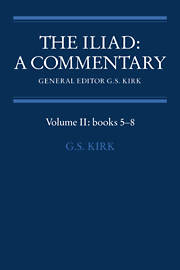3 - The speech-element in the Iliad
Published online by Cambridge University Press: 05 June 2012
Summary
One tends to think of heroic epic as mainly composed of objective narrative; yet nearly half of the Iliad consists of direct speech, and the proportion in the Odyssey (whatever view one takes of the status of Odysseu's reminiscences in bks 9–12) is still higher. This remarkable statistic means that both Homeric epics are, to a substantial degree, dramas rather than narratives – or rather, narrative expressed as drama, in which the progress and overtones of the action are evoked as much through confrontations and conversations between the characters involved as by the ostensibly neutral descriptions of the poet as observer and narrator.
Narrative itself deserves closer attention than it has traditionally received, and the new approach of ‘narratology’ in its less schematic forms helps to unravel the different strands of ostensibly straightforward description. This will be discussed by M. W. Edwards in vol. v. But it is the special qualities of speech in the Iliad that form the subject of the present chapter, adding an additional dimension to those of formular language, enjambment, colometry and typical themes that have already been summarily examined as elements of the complex totality of Homeric style. Attention to the problem has been spurred by an important article by Jasper Griffin, ‘Homeric words and speakers’, in JHS 106 (1986) 36–57. It may be that differences between speech and narrative – which for him raise difficulties about orality – do not constitute quite the paramount aspect of Homeric style that Griffin at one point suggests.
Information
- Type
- Chapter
- Information
- The Iliad: A Commentary , pp. 28 - 35Publisher: Cambridge University PressPrint publication year: 1990
